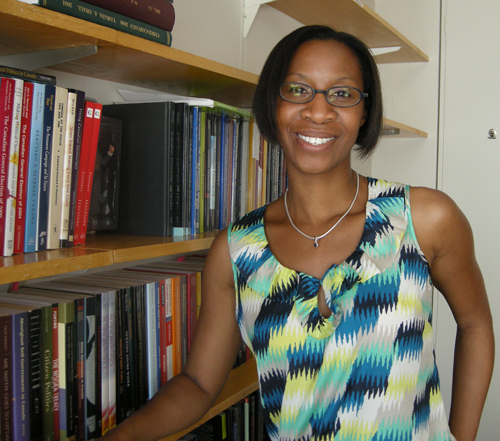
President Barack Obama has more than nine million people following him on Twitter. Prime Minister Stephen Harper has nearly 156,000. “Harper can never hope to have as many followers as Obama,” says political science professor Tamara Small, “but it is interesting to see how Canadian politicians use Twitter and other social media to get their messages out.”
Harper tweeted last month about his cameo role on Murdoch Mysteries. Earlier he tweeted about adopting a cat from the Ottawa Humane Society and encouraged followers to vote for their favourite potential kitty name on his Facebook page; “Stanley” won. Those personal tweets are mixed in with ones linking to official news releases and statements. “You can tell when Stephen Harper actually tweets, because those are so different; the rest are very party focused,” says Small.
After earning a U of G undergraduate degree in political science in 1999, Small completed graduate work at the University of Calgary and at Queen’s University. She taught at Mount Allison University for five years before joining the U of G faculty this summer. Her main area of research, which started with her PhD thesis, is the use of digital media by Canadian political parties. In her thesis, she did an analysis of digital media in the 2004 election.
In Canadian politics, there’s plenty of digital media being used. “Canadians love their technology,” says Small. “In 2004, my focus was on the use of websites. I’ve studied every election since 2004, and now my research focuses more on Twitter, YouTube, Facebook and other social media sites. I have some 3,000 tweets from the 2011 election to analyze for my next study.”
Her interest in politics began quite accidentally. Small says her family wasn’t especially political, but in high school she needed an extra credit and enroled in a class on politics. “It changed the direction of my entire life.
“People often think Canadian politics must be boring, but all you have to do is look at some of the things that have happened in the past few years. It’s definitely not boring.”
Small examines how political parties use information technology and social media during elections, as well as how the government uses digital media to communicate with the public. Canadian government websites, she says, are generally helpful, but the government and the political parties don’t come close to star status on Twitter, which is used more effectively by other organizations.
That may not be a terrible thing. “Maybe the things we need to hear from our government are not best shared in 140 characters,” says Small. “Maybe not all government departments need to be on Twitter. I think there is an expectation that governments and politicians will use Twitter, but they are not going to use it the same way as ordinary people do.”
One of her articles entitled “What the Hashtag?” analyzes tweets with the hashtag #cdnpoli. It’s the most popular Canadian political hashtag, and Small says it gives followers a good, but fast-paced, sense of what is going on in Canadian politics. Yet, it’s seldom used by politicians.
Her belief is that the Internet, Twitter and other forms of digital media are good for mobilizing people but not for converting them. “The trouble with getting your message out through Twitter, for example, is that people have to choose to follow you.” On the Internet, people have to search for you or the topics you are sharing information on; it’s quite different from television, where commercials just appear.
Small is also interested in understanding how the use of technology may change politics. Will we see more negative campaigning through tweets, for example, or more situations such as the one where one young woman was forbidden to enter a Conservative party rally because she had a photo on Facebook with former Liberal leader Michael Ignatieff?
In some other countries, digital media is used by oppressive regimes for surveillance and control, she adds. “We assume that the Internet is inherently democratic, but it can also be used in an anti-democratic way.”
In her free time, Small is an avid knitter and admits that social media played a role in that, too. “I’d never have learned how to knit without YouTube,” she says. “I still use it all the time when I’m trying to master a new stitch.”